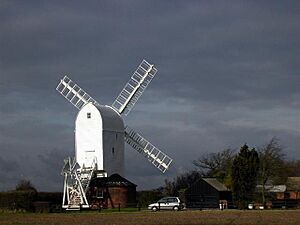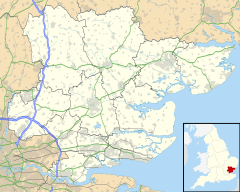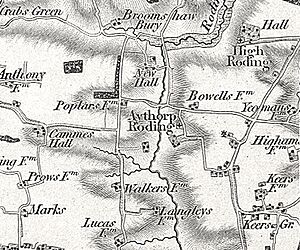Aythorpe Roding facts for kids
Quick facts for kids Aythorpe Roding |
|
|---|---|
 Aythorpe Roding windmill |
|
| Population | 214 (2011) |
| OS grid reference | TL584150 |
| Civil parish |
|
| District |
|
| Shire county | |
| Region | |
| Country | England |
| Sovereign state | United Kingdom |
| Post town | DUNMOW |
| Postcode district | CM6 |
| Dialling code | 01279 |
| Police | Essex |
| Fire | Essex |
| Ambulance | East of England |
| EU Parliament | East of England |
| UK Parliament |
|
Aythorpe Roding is a small village in Essex, England. It's part of a group of eight villages and hamlets called The Rodings. Aythorpe Roding is about 9 miles (14 km) northwest of Chelmsford, the main town of Essex.
The village is governed locally by its own parish council. It also has a village hall and a cricket club, which are important for community life.
Village History: What's in a Name?
The name "Roding" comes from "Rodinges," which was first written down in the famous Domesday Book. Later, in 1248, it was called 'Roeng Aytrop'. The 'Aytrop' part comes from a man named 'Aitrop'. He owned the land under the Abbess of Barking.
An older name for the area was 'Grumbalds Roding'. Over time, different families owned the land. For example, in 1670, Richard Luther owned it. By 1751, it was also known as 'Eythorp Roding'.
Life in Aythorpe Roding Long Ago
In the 1800s, Aythorpe Roding was called 'Aythrop Roothing'. It was part of the Dunmow area. The local church, St Mary the Virgin, has records going back to 1559.
The village was quite small. In 1841, about 285 people lived there. By 1881, the population was 237. The parish covered about 1,361 acres (5.5 sq km) in 1848.
What Did People Do for Work?
The land in Aythorpe Roding had heavy clay soil. Farmers mainly grew wheat, barley, and beans.
In 1848, the village had nine farmers. There was also a person who sold beer, a shopkeeper, and a blacksmith. A blacksmith makes and repairs things out of iron.
By 1882, there were fewer farmers, only five. The village also had the owner of The Carpenters' Arms public house. A public house is like a local pub. There was also a grocer and draper, who sold food and fabric. The village even had a miller who worked at the windmill.
 | Shirley Ann Jackson |
 | Garett Morgan |
 | J. Ernest Wilkins Jr. |
 | Elijah McCoy |



